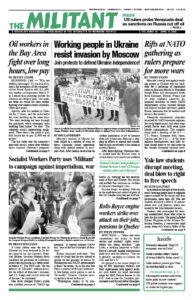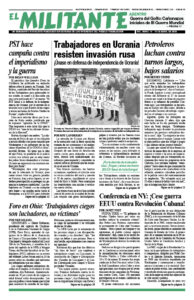MONTREAL — “More and more corporations are trying to break unions and workers’ rights everywhere are being attacked,” Tom Larin, a striking inspector at Rolls-Royce’s aircraft engine maintenance plant here, told the Militant. “You see it globally, including in Canada, the U.K. and the U.S.”
He pointed to the recent illegal firing of 800 unionized workers and their replacement with agency workers paid below the legal minimum wage by P&O Ferries bosses in the U.K. And to how the Canadian government used the anti-labor Emergencies Act to break up February protests by truckers in Ottawa.
The 530 Rolls-Royce workers, members of the Quebec Confederation of National Trade Unions (CSN), went on strike March 15. “Around 10 years ago the company said workers had a ‘toxic culture’ and it had to change,” Larin explained. “It was like a kick in the teeth. They were looking for every possible way to save money to increase their profits. Eventually they began to go after our wages, our pensions and our benefits.”
This is their first strike since the 1970s, Paul d’Amico, who has worked there 33 years, said. “During that time the unions have become weaker and weaker.”
Union members realized they had to fight back, Larin said, especially when Rolls-Royce showed its unwillingness to negotiate after the contract expired two years ago. “We organized a number of one-hour work stoppages, a one-day walkout, and several noise-making protests in the plant to show them how unhappy we were,” he added. “These actions put us in a stronger position to strike.”
As workers were meeting to vote on a strike mandate, the company informed them that they were locked out. Angered by the company’s show of contempt for the union, the vote was 94% for walking out.
Workers told the Militant that pensions are the single biggest issue. Even though they haven’t had a pension increase in 10 years, Rolls-Royce wants more cuts to their retirement benefits. The bosses want to get rid of the defined benefit plan that covers most workers and replace it with an inferior and less secure defined contribution scheme.
Their current pension plan is also two tiered, with the defined benefit plan only available to workers who were hired before 2013. The union is fighting to end this, Jawad Kassef, a picket captain said. “It creates divisions. We’re fighting for equality for everyone. It’s important for the new generation of workers.”
The company wants to double the cost of health benefits for current employees and demands the elimination of all benefits for retirees. The union is demanding a five-year contract, with wage levels and benefits retroactive to March 2020 when the old contract ran out. This includes a 5% annual wage increase.
“We’ve given up a lot of concessions to the company,” Kassef said. “Now we’re saying enough is enough. This has to stop.”
Jim Upton, a retired member of the CSN local, contributed to this article.

